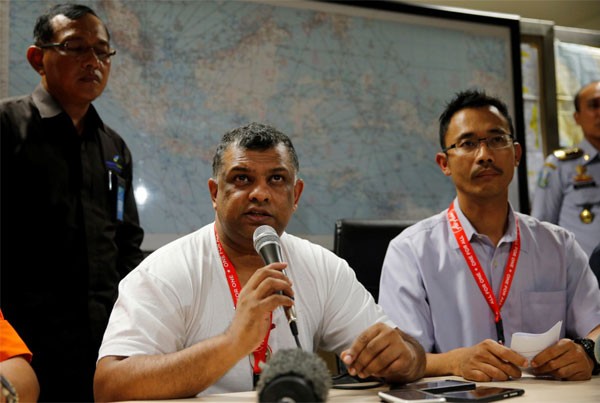Ever since AirAsia Flight 8501 disappeared Sunday, the airline's chief executive Tony Fernandes has quickly become a constant presence, both in the real and digital world, with a response that is earning him praise.
When the plane, scheduled to fly from Surabaya to Singapore on Dec. 28, disappeared from the skies near Indonesia, the Malaysian CEO posted a message on Twitter. "This is my worst nightmare," he wrote. He also immediately traveled to Surabaya and met with the families of passengers gathered there.
On Tuesday, when AirAsia confirmed that the wreckage found in the Java Sea was from the plane, he posted on Twitter again saying that he was "rushing to Surabaya" to be at the center of the crisis. He also issued an apology on that same day, putting the burden responsibility at his feet.
"I apologize profusely for what they are going through," the CEO said at a press conference. "I take responsibility. That is why I am here. I am not running away from my obligations even though we don't know what's wrong [that caused the crash]. The passengers were on my aircraft, and I have to take responsibility for that."
So far, the approach of the AirAsia's CEO to the crisis has impressed observers. "I don't think this will break them," said Zulkifli Hamzah, research head at Malaysia's MIDF Amanah Investment Bank Berhad. "I think the main thing right now is to protect their brand, and I think that will be instrumental in the future of their company."
The AFP news agency also noted in a report how Mr. Fernandes "maintained an image of calm Sunday even as his company plunged into its first major crisis."
Once a state-run airline with millions of dollars in debt, Fernandes has been credited for turning AirAsia into one of Asia's largest budget airliners. He has become the public face of the company and has been known to spend several days a month working with cabin and ground crews and even involving himself in low-level hiring.
But while Fernandes's response is earning him praise, analysts also note that it is now more essential for the airline CEO to be at the center of the disaster given its sheer scale.
"When a crisis of this enormity occurs, it's important for any CEO to be present," wrote Washington Post columnist Jena MacGregor. "Yet when a CEO is as tied to the company's image as Fernandes is, it's even more critically urgent that the leader be front and center."



























